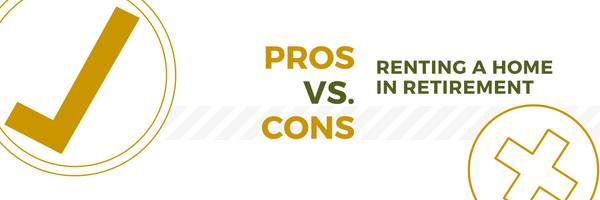One of the biggest choices many older homeowners will face when deciding to downsize is choosing to sell and rent or sell and buy a smaller home. Empty nesters are thinking, “ Our 5-bedrooms house is to big for us now, not to mention the money drain. It’s time to move.” Downsizing retires should take some time to compare all of the options before making a final decision.
Given that housing can be your single greatest monthly expense, it pays to put some thought into renting versus owning once you’re retired and on a fixed income.
What’s the best option for you moving forward? Here are some of the benefits and drawbacks to both options.
Many retirees decide to buy even though home ownership is expensive. There are some great reasons to own in retirement:
- You can reduce your expenses by selling your family home and buying a new, less expensive property. You may also have extra money left over from the sale.
- It can be important for you to leave a valuable asset to your heirs and owning property can be a great way to achieve that.
- There is no landlord to increase your rent or tell you to move. Owning can be more predicable if you plan to stay for a long time.
- The equity you build can be a source of income.
There can be a downside to owning during your senior years:
- It is important to think about the maintenance owning a home can have. As you age, your ability to do some items yourself may decline, which will add to your costs. Dealing with major repairs can be risky on a fixed income.
- You will need to consider the cost of increasing property taxes and insurance, even with no mortgage payment the cost of owning can still increase over time.
- You may want to move somewhere more accommodating to aging or disability down the road. Consider how long you expect to live in your new home, the shorter the stay the less financially attractive owning a home becomes.
- When you buy a new place with the proceeds from selling your home, that money is tied up and not easily accessible should you need it.
Many argue that it’s best to own a home in retirement, but home ownership isn’t for everyone. When you sell the family home, it might be worthwhile to rent instead. The biggest difference is in the level of responsibility and freedom. Here are a few benefits of going this route:
- Your housing cost is whatever your rent is. Fixed costs tend to work better, and can be cheaper, when you are living on a fixed income.
- You can let the responsibility of maintenance and unanticipated repairs be someone else’s problem.
- You can test out different homes and locations. You plan to move from an urban centre to a quiet coastal town, for example, or an apartment instead of a house. If the move turns out to be a bad idea, you can just move on. By renting you may be able to try out a couple of options to see which one is the best fit.
- You could use the cash from the sale of your home to build your nest egg or boost your finances. With this money freed up, you may feel more comfortable spending it on vacations or other items you have dreamed about while you are healthy enough to enjoy it.
While renting in retirement has its benefits, switching from home ownership to rented accommodation isn’t necessarily the best move for everyone. Here are a few drawbacks to think about:
- Usually retired people who are selling their family home have paid off their mortgage. If you move to an apartment, you’ll have to pay rent. Your rent payments will be an expense and you can expect it to increase over time.
- While there’s something to be said about not having to deal with maintenance and repairs, when you’re renting, you are at the mercy of your landlord or management company to fix problems in a timely manner and keep things running smoothly.
- You have less control than owners over things like decorating and renovating. Renters often have difficulty modifying their spaces if they acquire any physical ailments as they age.
- Many retirees with pets may find it difficult to find a suitable rental.
By the time many of us retire we’ve become so accustomed to owning a home that the idea of renting might never occur to us. A house is likely the largest single investment you’ll ever make and as you enter retirement – a time when most mortgages have been paid off – it can represent a sizeable asset.
But if you are pondering a change of address in retirement, it’s worth considering all the advantages and disadvantages of being an owner versus a renter, even if you haven’t been a renter since avocado coloured appliances were in style.
There really is no right or wrong answer. A lot depends on your personal financial situation. The more thought you put into your decision, the better your chances of making the move that’s best for you.
Source: Downsizing Retirees: Should you Own or Rent? By: Boomer, Apr 26, 2018



.png)


Post a comment